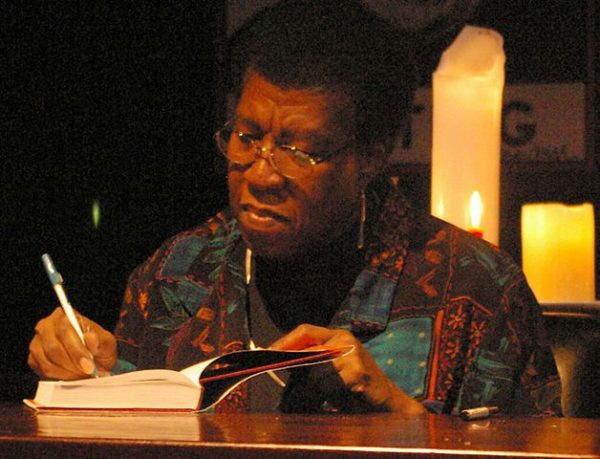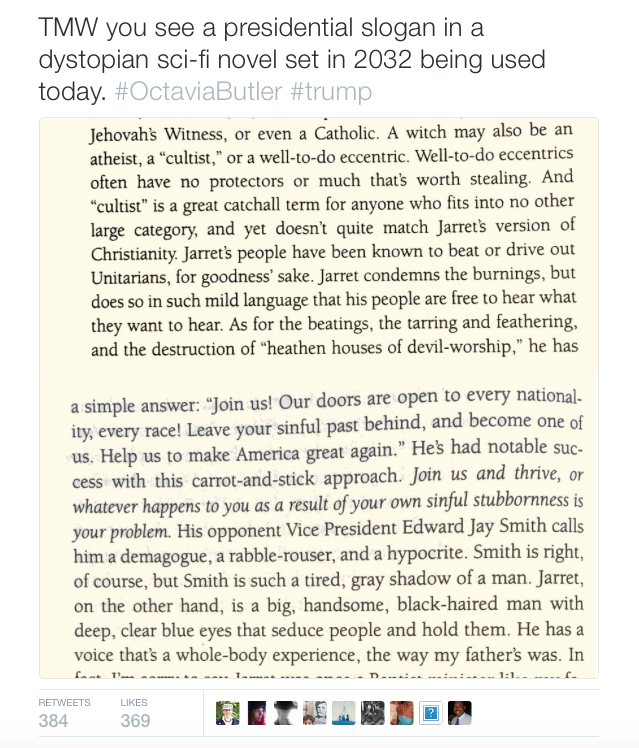Octavia Butler Make America Gret Again

Image by Nikolas Coukouma, via Wikimedia Commons
The Internet has been abuzz and atwitter these by few months with stories about prophetic predictions of the rising of Trump, cached in aboriginal texts similar Dorsum to the Future Ii, and an episode of The Simpsons from 2000. Then there'south Mike Judge's now x-year-old satire Idiocracy. While non specifically modeled afterward a Trump presidency, its depiction of the state equally a violent, backward dystopia, armed and corporate-branded to the teeth, sure does resemble the kind of place many imagine Trump and his supporters might build. These allusions and direct references don't necessarily provide evidence of the writers' clairvoyance; later on all, Trump has threatened us with his candidacy since 1988, with mostly unserious statements. But they practise testify us that nosotros've seen this version of the future coming for the final 30 years or and then.
I prediction you may have missed, however, offers us a much more than sober take on the rising of a frightening neo-fascist during a time of fear and civil unrest. As Twitter user @oligopistos pointed out, in the second book of her Earthseed series, The Parable of the Talents(1998), Hugo and Nebula-honor winning science fiction author Octavia Butler gave united states Senator Andrew Steele Jarret, a violent autocrat in the year 2032 whose "supporters have been known… to class mobs." Jarret's political opponent, Vice President Edward Jay Smith, "calls him a demagogue, a rabble-rouser, and a hypocrite," and—nigh presciently—Jarret rallies his crowds with the call to "brand America peachy over again."

Though Trump has trademarked it, the slogan did not originate with him, nor fifty-fifty with Butler's Jarret character—the 1980 Reagan-Bush campaign used it, as Matt Taibbi pointed out Rolling Stone last year. (Historians have even shown that another of Trump'southward slogans, "America First," was used by Charles Lindbergh and "Nazi-friendly Americans in the 1930s.") Again, proto-Trumpism has been in the zeitgeist for a long fourth dimension. While Butler may take used "Make American Great Again" from her memory of Reagan'southward first campaign, the style her character employs it speaks to our moment for a number of reasons.
It's truthful that Senator Jarret differs from Trump in some pregnant ways: "Jarret's beefiness is with Canada instead of Mexico," writes Fusion, and "instead of business acumen as his main credential, faith is Jarret'southward stump. He's the head of a group called Christian America, which is intolerant of other religious views, and whose supporters burn down 'witches'—significant Muslims, Jews, Hindus and Buddhists—at the stake." Our current candidate may have co-opted the religious correct, but he doesn't speak their linguistic communication at all. Withal, he has made promises that give secularists and not-Christians chills, and religious intolerance has formed the backbone of his campaign and of the rhetoric that has driven his party to the far right.
Jarret and the fanaticism he inspires become central the novel'due south story, but the crucial background in Butler's 1998 depiction of a post-apocalyptic 2032 are the conditions she identifies every bit giving rise to the Senator'due south rule (and which she described in the first book, Parable of the Sower). In Talents, the narrator's male parent Taylor Franklin Bankole writes,
I have read that the period of upheaval that journalists have begun to refer to as "the Apocalypse" or more commonly, more bitterly, "the Pox" lasted from 2015 through 2030—a decade and a half of chaos…. I have also read that the Pox was acquired by accidentally coinciding climatic, economic, and sociological crises. It would exist more honest to say that the Pox was acquired past our own refusal to bargain with obvious problems in those areas. We caused the problems: then nosotros sabbatum and watched as they grew into crises.
In Butler's fiction, the rise of Senator Jarret and his mobs is an outcome of the same kinds of impending crises nosotros confront at present, and that far also many of our leaders dutifully ignore as they phase increasingly acrimonious and bizarre forms of political theater. Butler'south indirect warning to us in Parable of the Talents may exist less nigh the demagogic leader and his cult—though they pose the most dire existential threat in the book—than almost the causes and weather condition that created "the Pox," the kind of social collapse that Kurt Vonnegut warned of ten years before Butler in his time-capsule alphabetic character to the people of 2088, vaguely identifying similar kinds of "climatic, economic, and sociological" crises to come. Would that nosotros could abandon empty spectacle and heed these Cassandras of the near time to come.
via The Huffington Post
Related Content:
In 1988, Kurt Vonnegut Writes a Alphabetic character to People Living in 2088, Giving 7 Pieces of Advice
Isaac Asimov Predicts in 1964 What the World Will Await Like Today
Noam Chomsky on Whether the Rise of Trump Resembles the Ascension of Fascism in 1930s Deutschland
Josh Jones is a writer and musician based in Durham, NC. Follow him at @jdmagness
Source: https://www.openculture.com/2016/07/octavia-butlers-1998-dystopian-novel-features-a-fascistic-presidential-candidate-who-promises-to-make-america-great-again.html
0 Response to "Octavia Butler Make America Gret Again"
Post a Comment